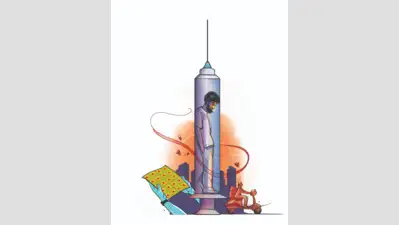ARTICLE AD BOX

Drugs are couriered through electronic items like phones. In one instance, ecstasy pills were found inside a shampoo bottle. The lack of physical exchange between buyer and seller, combined with the legal grey zone of delivery apps’ responsibilities, creates an enforcement vacuum. Illustration by Gireesh M P
From his hostel room in Chennai, a student opens a courier app to book a pickup for a notebook. Only, tucked between the pages of scribbled notes are tiny colourful squares of what looks like blotting paper.
Minutes later, a courier arrives, picks up the notebook, completely unaware that he is, in fact, delivering a consignment of LSD.“More than 50% of drug peddlers operate using aggregator apps such as Porter, Zepto and Uber Courier to deliver illegal drugs,” says Lakshman A, assistant commissioner, Narcotics Intelligence Bureau – Crime Investigation Department (NIB-CID).
Recently, a 20-year-old engineering graduate was sentenced to 10 years by the city’s drug court.
Dressed in formals as if on his way to an interview, he didn’t look like the average peddler one would imagine. But he was convicted of ordering synthetic ‘punisher’ pills from the Netherlands through the dark web. What stunned the court — and earlier the investigators — was not just the international delivery, but what his seized phone revealed: a network of students operating as both users and distributors across multiple college campuses in Chennai.
His phone had chat histories, wallet IDs, links to crypto transaction chains, and messages from more than 60 contacts across different educational institutions, many of whom had placed drug orders or offered peer-to-peer delivery. Unlike street-level peddlers, most of these contacts were students using pseudonyms and coordinating orders using encrypted Telegram groups.“Student-run rackets are harder to bust than traditional narcotics operations,” says an officer from Greater Chennai Police’s Anti-Narcotics Intelligence Wing (ANIU).
“Instead of chasing suppliers with criminal records, we now have to track 19- to 23-year-olds with clean police histories and often good academic records.”Drugs, he says, are couriered through electronic items such as phones. In one instance, ecstasy pills were found inside a shampoo bottle. The lack of physical exchange between buyer and seller, combined with the legal grey zone of delivery apps’ responsibilities, creates an enforcement vacuum.“Delivery partners do not inspect packages or ask questions as long as consignments are within weight limits,” says a 22-year-old from Madipakkam, a peddler recently released on bail.“Most networks operate through decentralised micro-cells,” says an officer. “One student collects cryptocurrency payments and places orders on the dark web. Another receives the parcel through a third-party delivery app. A third oversees redistribution.
No single person handles bulk quantities. It makes it difficult to get major seizures.”Synthetic drugs, especially LSD blotters, MDMA pills and meth, require only tiny packaging, making them easy to move. Unlike ganja, which emits a strong odour and is easier to detect, these pills don’t raise suspicion unless tested. Ganja continues to follow traditional smuggling routes, mostly coming from states such as Odisha or Andhra Pradesh by train.Railway police say traffickers often board unreserved compartments with ganja bags, but don’t carry them all the way. Instead, the bags are planted in AC coaches where security checks are rare. “Another contact collects the consignment mid-route or at the destination,” says an officer. This tactic exploits the fragmented responsibility between the railway police force, govt railway police and state police, none of whom are tasked with inspecting A/C compartments unless tipped off.“More than 90% of recent bulk ganja seizures involved the AC coach drop-and-pick method, making it difficult to tie the substance to a particular suspect,” says an RPF officer. Despite periodic raids, the method persists because couriers change hands quickly and suspects avoid staying on board. “It’s almost like they are always two steps ahead.”Email your feedback with name and address to [email protected]



.png)
.png)
.png)
















 22 hours ago
5
22 hours ago
5









 English (US) ·
English (US) ·